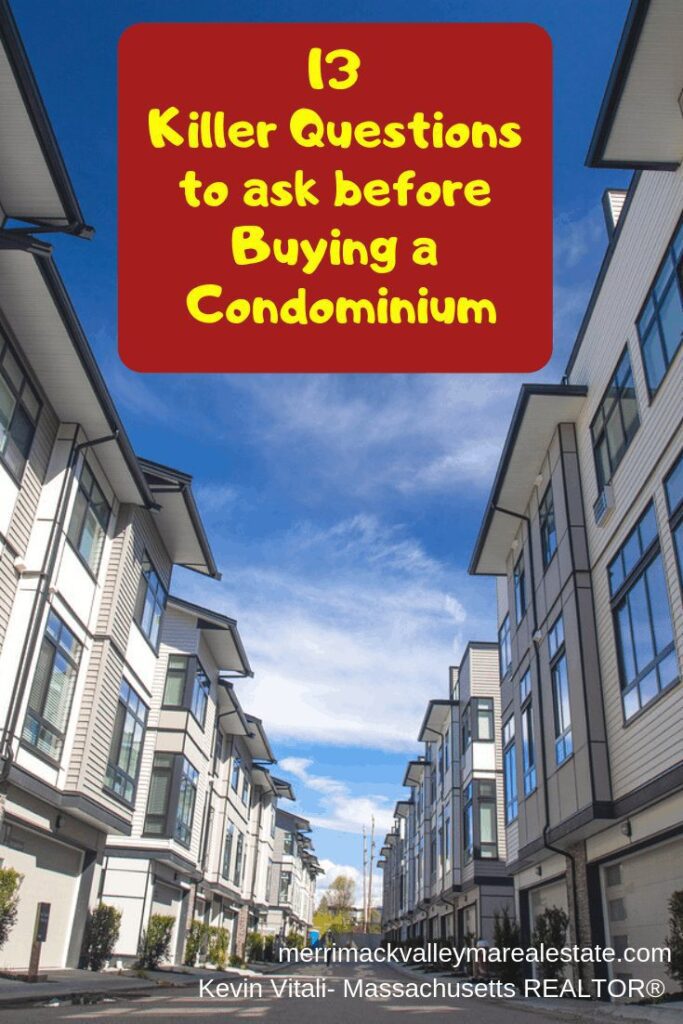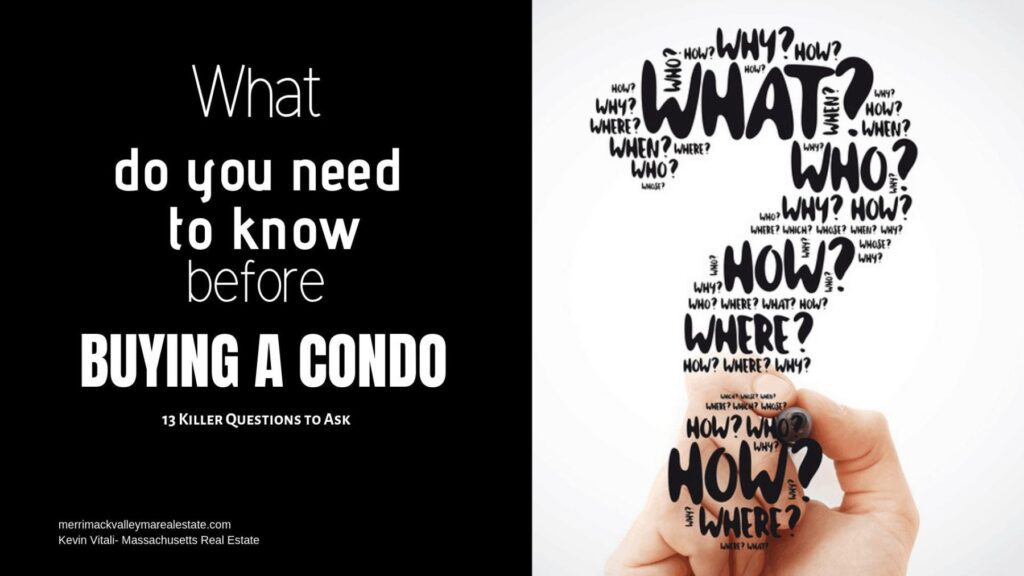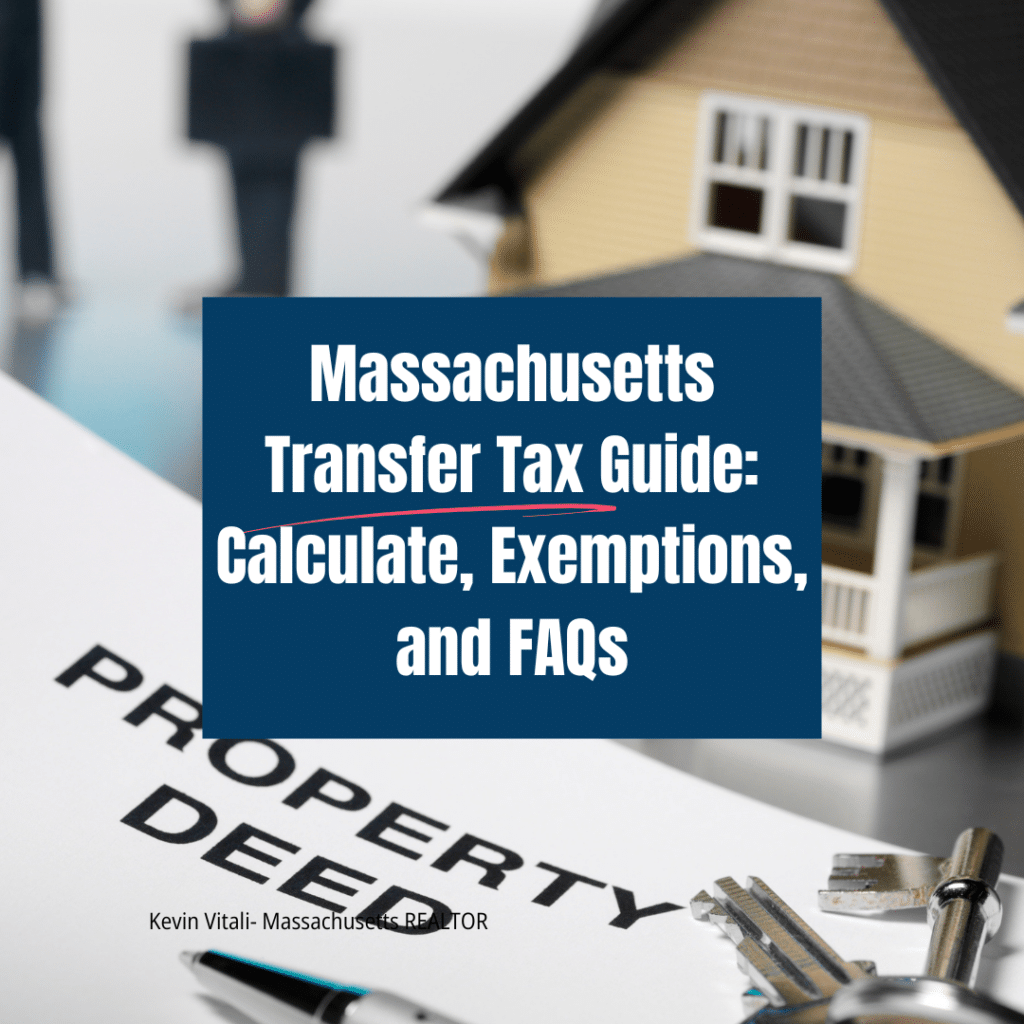 Buying a condo is a little different than a single-family home. Of course, you have the actual unit you are considering purchasing. There are additional questions to ask before buying a condo.
Buying a condo is a little different than a single-family home. Of course, you have the actual unit you are considering purchasing. There are additional questions to ask before buying a condo.
But there are now other things to consider when purchasing a condo versus a single family home.
You have the governing of the condominium complex, common ownership, rules and regulations, the financial stability, who owns what, who repairs what….. the list goes on.
Because you have shared ownership when buying a condominium, you have to consider aspects of the entire condominium complex as a whole above and beyond the unit you will be purchasing.
There are important questions to ask before buying a condominium that will give you an overall sense of the stability, function and tone of a condominium complex you are considering a purchase. A runaway board of trustees, poor management, fiscal irresponsibility or petty neighbors could definitely ruin the experience of condo ownership.
Quick Overview Of The Governing and Management Of A Condominium Complex
Before we delve into the questions you should ask before buying a condo, its important to understand how the managing of a condominium complex works.
Generally, upon purchasing you become a member of the Homeowners Association or HOA. An HOA is in charge of governing and maintaining a planned community like a condominium complex.
The HOA is made up of a Board of Trustees. It is their job to make up a set of rules for the members to live by, govern the community, maintain the complex and manage the money received in condo fees.
Often the HOA will hire a management company to oversee the daily management and accounting that is needed under their direction.
So when you purchase a condominium you will have interaction with the HOA and Management Company regarding what is going on in your complex.
Questions To Ask When Buying A Condo
Ask the right questions you will get an idea of what is going on with the HOA, the Management Company, the finances, maintenance and the overall community before you purchase.
1- What Are The Condo Fees and What Do They Cover?
Being part of an HOA you will most likely be paying condo fees that cover the daily operation and maintenance of the complex.
Know exactly what your condo fee covers so there are no surprises. An HOA fee will often cover garbage removal, snow removal, landscaping, road maintenance, master insurance, exterior maintenance and reserves.
But condo fees can include water and sewer and even sometimes heat and hot water. Never assume when it comes time to purchase a condo.
2- May I Review The Current Budget?
One question to ask when purchasing a condo is to see last years budget and the current years proposed budget. The budget will show you how much money is being taken in by condo fees, fines and assessments and how much is being spent.
Look to see if adequate money is going into the reserve fund monthly.
And if there are any substantial loan payments ask why the HOA had to take out a loan and when will it be paid off. Often a loan may trigger extra condo payments to cover the payment of the loan.
Make sure the HOA is not paying for daily operations and maintenance out of the reserve funds and they are collecting enough in fees to cover those expenses.
If there are any line items that seem out of line, don’t be afraid to ask questions.
3- How Much Money Is In The Reserve Fund?
The reserve fund is meant to cover unexpected expenses and long term capital improvements like new roofs or siding. Typically 10-25% of your condo fee should be slated to go into the HOA’s reserve fund.
How much is enough? That can vary greatly but it should be 70 to 100% of what the last reserve study indicted the HOA should have.
If the condo is pulling in $450,000 a year and they only have $20,000 in reserves it is time to ask more questions. A bank lending on the unit wants to see a minimum of 10% of the budget in reserves, which quite frankly is probably not enough.
Having adequate reserves will eliminate or minimize ever having the need for a special assessment. But on the same hand you don’t want money sitting around for no reason either.
4- What Percentage Of Homeowners Are In Arrears On Their Condo Fees?
There are always going to be some owners late on their condo fees. But what percentage is in arrears?
Banks will not lend on communities with more than 15% of its owner in arrears on condo fees.
It goes without saying if enough money is not collected every month the HOA can’t meet the budget. This is especially true of very small complexes. Make sure everyone is pulling their weight so that part of the shortfall doesn’t fall on you.
5- Are There any Special Assessments?
Special assessments occur when there is not enough money in the budget to cover expenses or improvements. The HOA will ask for additional money outside of the monthly condo fees to cover these expenses. A special assessment could be a few hundred dollars to a few thousand or more.
Often, if it is a larger amount the HOA will secure a loan and allow you to pay over time.
But a well-managed complex will rarely seek special assessments. They have a handle on the current financil picture as well as in the future.
A management company that is on the ball will be doing a reserve study every several years. The study determines if an HOA is collecting enough in reserves to cover future expenditures.
Find out if you are buying into a current special assessment that you have to assume or if there are any likely to come to fruition in the near future.
6- What Is The History Of Special Assessments?
While it may be necessary to collect a special assessment now and then, an HOA constantly having special assessments shows poorly managed finances.
If you find there have been several special assessments in a short period of time, definitely dig deeper and find out why. A past history can indicate what may happen in the future. Have your agent help you determine if it is from poor management or if it was a series of unforeseen issues.
7- What Are The Rules?
Living in a condo can mean there are rules to abide by. Some can be lax, others can be very stringent. Many condos have restrictions on pets, satellite dishes, where visitors park, grills on the deck, etc… Definitely make sure you understand the rules you are agreeing to live by.
Some of the condo rules and regulations could actually be a deal killer for you. Probably the biggest issue for many people are a condominium’s pet policy. Many restrict the size, the amount and the kind of pets you can have. Fines are levied daily for every day you are non-compliant with a rule. And, pet restrictions are getting more stringent on a regular basis.

8- Where Are The Parking Spots For The Unit?
Don’t ever assume where the parking is for the unit you are about to purchase. Ask where the parking spots are and if they are deeded or assigned. Deeded means they are yours and will never change. Assigned means your parking can change as management sees fit.
You may think the parking spots in front of your unit may go with the unit but again don’t ever assume. They could be four doors down!
If you have teen children with their own cars if you only have two parking spots find out where they may be able to park. I have had complexes that won’t allow a third car.
9- What Does The Master Insurance Cover?
Usually when you buy a condo there is a master insurance policy included in the HOA. Find out what that insurance policy covers.
Many policies do not cover things like sinks, cabinets and flooring and an additional policy may be needed for proper coverage. Other policies will be what is called an all in policy which does cover the entire unit.
The gap policy or what is called in HO6 is small money but it is important to know all of your expenses.
10- What Is The Ratio Of Owner Occupants To Non Owner Occupants?
A non-owner occupant is usually a renter. A complex that has a high ratio of investors renting out is not usually a great place to make home. An investor’s goal is to make money versus a homeowner that just wants a nice place to live.
Investors are less likely to vote for improvements and upkeep that pulls money out of their pocket. Their main goal is to squeeze every cent of profit out of their investment. The investor’s goals are usually counter to owners that have made the complex their home and want to maintain the look as well as the value.
In addition, renters aren’t going to care like an actual owner and will be more likely to let things get run down.
Of course, every complex will have a few renters. But you don’t want a complex overrun with renters where the investors have a strong say in how money is spent. A good ratio would be 10-15% of non-owner occupants.
11- Is There Pending Litigation Against The HOA?
Litigation can be costly and drag on for years. You don’t want to get caught in a complex that has major pending litigation coming up. A minor slip and fall that insurance covers would not be a big deal but a discrimination suit could be devastating.
Furthermore, if you are seeking financing for a condo purchase the bank will not lend on a unit in a complex with any major pending litigation.
12- Can I Have Two Years Of The Meetings Minutes?
HOA’s will have regular meeting for all the member to attend. Most likely the board will record meeting minutes, though they are not necessarily required depending on the state.
The minutes could give you an idea of upcoming repairs, how they will be paid for, grievances and difficulties the board is facing. Reviewing the meeting minutes can give you a good idea of what is going on.
13- Can I Review The Master Deed and Declaration of Trust?
These are big documents and will take some time to read.
The master deed covers the division of ownership, what areas are common, what is deeded to each unit and what are common exclusive areas. It will give you and idea of what is your responsibility to maintain and what is the HOA’s responsibility.
The Declaration of Trust covers more of the governing of the complex. It will talk about the election of board members, voting rules, how grievances are handled and so on.
Final Thoughts
While there are many benefits to buying a condominium, you have to remember you are buying a piece of the whole and you will own a portion of the entirety.
For years of enjoyment to come, it is important to understand the makeup, the rules, the finances and the management of the complex. While you may love the actual unit, what is going on around you can make you miserable if it is not what you expected.
Asking some or all of the questions before purchasing a condo will give you some good insights to what is going on in the condominium complex as a whole.
Seem overwhelming? A good buyers agent will help you sort through the documents and know what questions to ask when you are about to purchase a condominium.
View All The Essex and Northern Middlesex County Condominiums for Sale
Other Condominium Resources:
- Sharon Paxson What You Need To Know When Buying A Condo
- Paul Sian Is Buying A Condo Right For Me?
- Glenn Shelhamer What To Do Before Buying A Condo
- Geoff Southworth Whats Behind Your Condo Fees?
9 Killer Questions to Ask When Buying A Condo was provided by Kevin Vitali of EXIT Group One Real Estate of Tewksbury MA. If you would like to buy a home and would like the assistance of a buyers agent. call me. We can sit down and discuss your upcoming purchase and see how I can best help you. 978-360-0422
Buyer Agency Services in the following areas: Northeast Massachusetts, Merrimack Valley, North Shore and Metrowest. Including the following communities and the surrounding area- Amesbury, Andover, Billerica, Burlington, Chelmsford, Dracut, Groveland, Haverhill, Lowell, Melrose, Merrimac, Methuen, Middleton, North Andover, North Reading, Reading, Stoneham, Tewksbury, Tyngsborough, Wakefield, Wilmington, WestfordWhen




